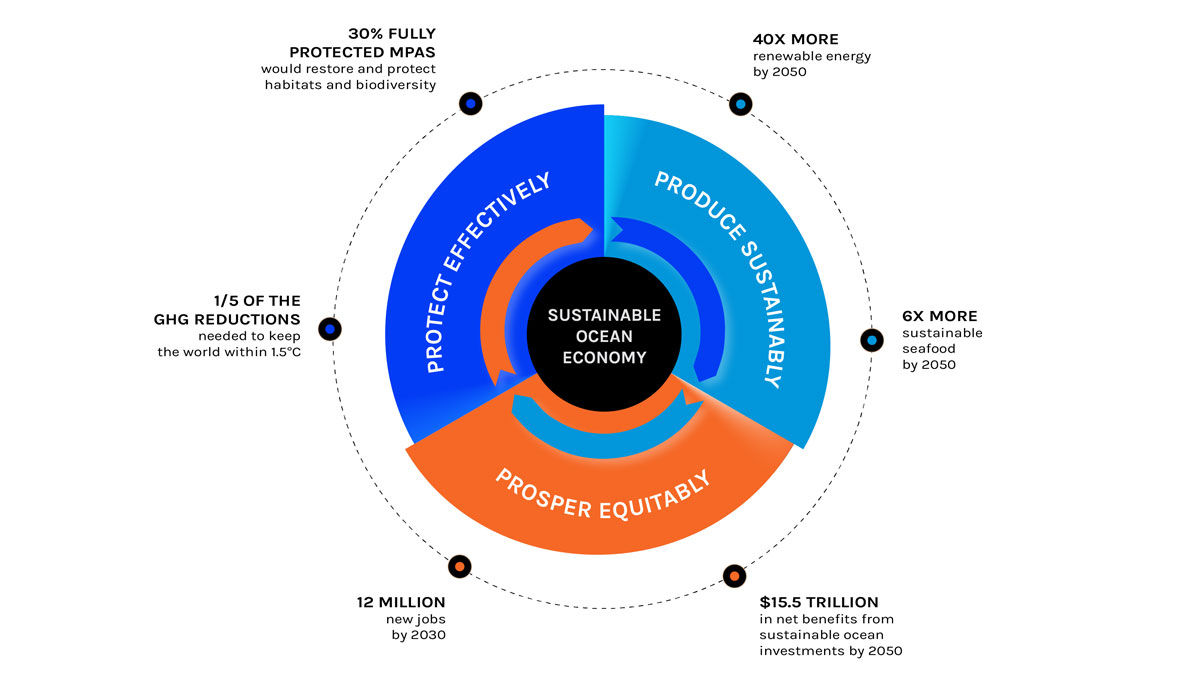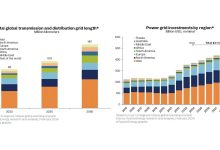Transformations for a Sustainable Ocean Economy
The leaders of 14 countries have put forward a new ocean action agenda underpinned by sustainably managing 100% of national waters.
The 14 members of the High Level Panel for a Sustainable Ocean Economy (the Ocean Panel), are heads of state and government representing people from across all ocean basins, nearly 40% of the world’s coastlines and 30% of exclusive economic zones.
The Ocean Panel developed a transformative set of recommendations and actions to advance a sustainable ocean economy, prioritizing a #healthyocean alongside sustainable production to benefit people everywhere.
SUSTAINABLE OCEAN ENERGY
The ocean holds tremendous potential to provide clean energy for the world. Scaling up ocean-based renewable energy will generate jobs and boost economic development while providing a pathway to decarbonisation. An ocean-based renewable energy revolution is in the making, and recovery efforts provide an opportunity to increase investment over the coming years. The pace and scope of development must match the state of the science, enable technology transfer and adoption, and minimise the impact on marine ecosystems to enable the delivery of sustainable ocean-based energy.
Ocean-based renewable energy is fast-growing and on the path to becoming a leading source of energy for the world.
Priority actions
- Invest in research, technology development and demonstration projects to help make all forms of ocean-based renewable energy—including wind, wave, tidal, current, thermal, and solar—cost-competitive, accessible to all and environmentally sustainable.
- Work collaboratively with industry and other stakeholders to develop clear frameworks addressing environmental impacts of ocean-based renewable energy, enabling capacity, co-existence, and integration with other uses of the ocean.
- Set clear goals, commit to deliver appropriate policy and regulatory measures, and remove market impediments to accelerate sustainable ocean-based renewable energy deployment.
SUSTAINABLE OCEAN TRANSPORT
Shipping, the most energy-efficient form of transport, is vital to international trade and connectivity as it continues to move over 90% of global goods. Maintaining global supply chains will be critical to support recovery from the COVID-19 pandemic and future crises. Technology to decarbonise and minimise the negative environmental impacts of marine transport exists but must be brought to scale. To ensure the industry is resilient, we must move decisively towards reducing greenhouse gas emissions by investing in solutions now to support rapid decarbonisation. Such investments will create jobs and build connectivity and the long-term resilience of global supply chains and island and coastal communities to future crises.
Shipping investments have effectively accelerated the shift towards zero-emission and low-impact marine vessels.
Priority actions
- Establish early national targets and strategies to support decarbonisation of vessels.
- Stimulate the development and adoption of technologies for producing and storing new zero-emission fuels.
- Incentivise sustainable, low-carbon ports that support the transition to decarbonised marine transport and shipping fleets through renewable energy and zero-carbon fuel supply chains.
Promote the transition of the global fleet to modern modes of propulsion and renewable fuels, including through strengthened regulations within the International Maritime Organization (IMO) and support technical cooperation for international capacity building.
- Minimise the transfer of aquatic invasive species by ships through an effective IMO framework, including its robust implementation.
- Apply the global regime for safe and environmentally sound recycling of ships.
- Promote quiet vessel programs by ports in sensitive areas and incentivise the use of vessel-quietening technologies considering international guidelines.
- Ban the use and carriage for use of heavy fuel oil in the Arctic through the IMO, and welcome other similar initiatives.
SUSTAINABLE NEW OCEAN INDUSTRIES
The ocean holds untapped opportunities to deliver medicines, animal feed, fuel, new materials and carbon-storage solutions, the need for which has been further evidenced and strengthened by the COVID-19 pandemic and its repercussions. We need to innovate and invest to scale up these opportunities based on science and environmentally responsible practices.
Innovation and investments in new ocean industries have boosted environmentally responsible and inclusive economic growth.
Priority actions
- Scale up environmentally responsible commercial farming of seaweed and algae to provide food and create alternatives for products such as fuels, aquaculture and agriculture feedstocks, biotech, and viable and sustainable plastic alternatives.
Explore and incentivise smart and sustainable cross-sectoral and co-located activities, such as ocean-based renewable energy sites to fuel zero-emission shipping and aquaculture farms.
- Promote fair and equitable sharing of benefits from research and development from marine genetic resources within national waters.
- Advance carbon capture and storage in the sub-seabed through international collaboration, appropriate incentives and mapping the storage potential of sub-seabed geological formations.
A PRECAUTIONARY APPROACH TO SEABED MINING
The deep ocean floor contains minerals that are useful for renewable energy technologies and may contribute to the transition to a low–carbon emission society. These areas are among the most isolated and poorly explored of all ocean ecosystems. The sensitivity of these ecosystems, our insufficient scientific knowledge and our limited understanding of the potential impacts of emerging ocean activities requires applying a precautionary approach, undertaking research and investigation, and developing a circular economy to reduce demand and help mitigate these risks.
Sufficient knowledge and regulations are in place to ensure that any activity related to seabed mining is informed by science and ecologically sustainable.
Priority actions
- Build partnerships to increase research, innovation, and deployment of urban mining (reclaiming and recycling metals from spent products, buildings and waste), and of innovative technologies that will reduce the need for new sources of metals and rare earth minerals.
- Initiate an international research agenda to improve understanding of the environmental impacts and risks of seabed mineral activities (especially regarding deep #oceanecosystems).
- Ensure that regulations for seabed mineral mining—under development by the International Seabed Authority—provide effective protection of marine environments by applying a precautionary and ecosystem-based approach, using science-based and transparent management, and ensuring effective compliance with a robust inspection mechanism.
- Ensure that all seabed mineral activities within and beyond national jurisdiction comply with robust environmental standards.
- Promote the participation of scientists from developing countries in research and make the results from research and the analysis of research findings publicly available, including through the International Seabed Authority.
#Oceanhealth
The ocean is critical for the global climate system and planetary health. It has absorbed 25% of all carbon dioxide (CO2) emissions and captured 90% of the additional heat generated from greenhouse gas emissions, but it is now warming and acidifying. The global community must act urgently to reduce greenhouse gas emissions, prevent biodiversity loss, restore and protect coastal and marine ecosystems, reduce pollution and take a precautionary approach to economic activity on the ocean floor.
REDUCE GREENHOUSE GAS EMISSIONS
The health of the ocean, and the livelihoods and economies that depend on it, requires the world to urgently reduce greenhouse gas emissions in line with the goals of the Paris Agreement. A sustainable ocean-based economy can play an essential role in this much needed emissions reduction, while providing jobs, supporting food security, sustaining biological diversity, and enhancing resilience. Ocean-based climate actions can deliver up to one-fifth of the annual greenhouse gas emission reductions needed by 2050 to limit warming to 1.5°C.
Ambitious climate action has set the world on track to achieve the goals of the Paris Agreement and restore ocean health.
Priority actions
- Establish and implement ambitious emissions reductions, covering all sectors, consistent with the Paris Agreement goal of pursuing efforts to limit global temperature increases to 1.5ºC.
- Implement the Ocean-Panel’s Call to Ocean-Based Climate Action by scaling up investments in ocean-based renewable energy, green shipping, sustainable seafood production, nature-based solutions and carbon capture and storage in sub-seabed geological formations.
- Include ocean-based climate action in reporting under the Paris Agreement.
REDUCE OCEAN POLLUTION
The ocean has become a sink for pollutants including plastics, chemicals, nutrients, and wastewater. While global awareness and action has been increasing, it has not been sufficient to prevent an increase in #oceanpollution. The response to the COVID-19 pandemic has caused a surge in production and consumption of protective equipment, much of which contains single-use plastic. This response, although necessary, has further accentuated the need to stop waste from entering the ocean. Efforts to combat harmful land-to-sea pollution should not be scaled back under the guise of economic recovery after the pandemic. Urgent action is needed to target the sources and management of pollution. Through the UN Environment Assembly, governments have endorsed a long-term vision of eliminating the discharge of marine litter and microplastics into the ocean. The G20 Osaka #BlueOceanVision and the #OceanPlasticsCharter further recognise the importance of embracing a lifecycle and circular economy approach.
Nutrient runoff contributes to deoxygenation of the ocean but suffers from less attention and action; it should be treated with the same level of urgency. The connection between the land and the ocean must be understood to address systemic sources of ocean pollution.







